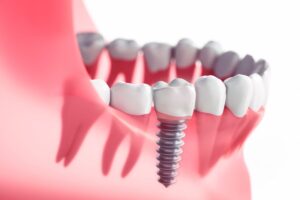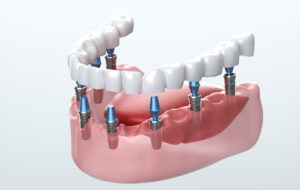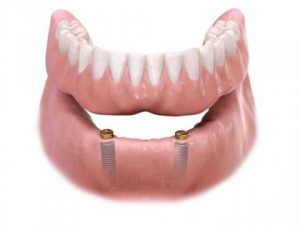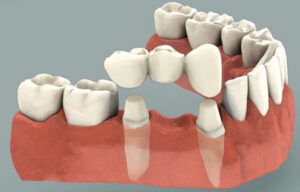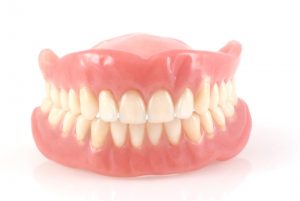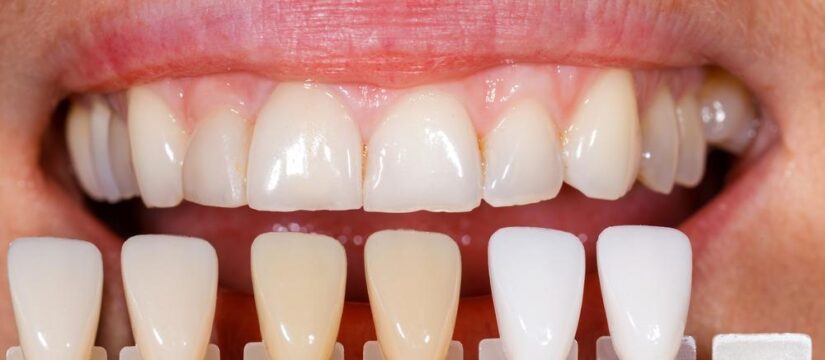
Choosing a tooth replacement can be straightforward. This article breaks down dental implants, bridges, and dentures, detailing the practicalities and costs associated with each tooth replacement option, to directly aid your decision-making when it comes to tooth replacements.
Key Takeaways
- Dental implants are a durable and natural-looking option for tooth replacement, long-term solutions that preserve tooth tissue and prevent bone loss, but require a significant investment and proper care to ensure longevity.
- Implant-supported bridges and crowns offer enhanced stability and aesthetic appeal for replacing multiple teeth, whereas removable dentures provide a non-invasive and cost-effective solution with maintenance requirements.
- The All-on-Four method is a minimally invasive and cost-effective approach for replacing full arches using only four implants, suitable for patients with significant bone loss or multiple missing teeth.
Exploring Dental Implants: A Superior Tooth Replacement Option
Dental implants have revolutionized the landscape of tooth replacement strategies. They offer a natural-looking, long-lasting solution to replace single or multiple missing teeth. Primarily made of titanium, dental implants mimic the appearance, sensation, and functionality of natural teeth, supporting single crowns, bridges, or complete dentures.
Dental implants offer several benefits, including:
- Preservation of natural tooth tissue, eliminating the need for cutting down adjacent teeth for conventional bridges
- Maintenance of overall health and integrity of surrounding teeth
- Prevention of bone resorption and deterioration, a common consequence of tooth loss
- Long-term solution that can last a lifetime with proper care
These benefits make dental implants a desirable option for tooth replacement.
Understanding the Implant Procedure
The dental implant procedure, involving the careful insertion of a titanium post into the jawbone, the attachment of an abutment to the implant, and the securement of a crown or denture, is an intricate process. The implant device itself is composed of the implant post, the abutment, and the overlying crown or denture. The use of titanium, a biocompatible and lightweight metal, ensures that the body does not reject the implant.
A temporary prosthesis may be used to restore the area during the healing process, a crucial part of which is osseointegration. This process involves the implant forming a strong bond with the bone, providing a stable base for the dental prosthesis. Candidates with strong bone health are considered suitable for dental implants, whether they need a single tooth or multiple implants.
Longevity and Care of Dental Implants
Although dental implants are engineered for durability, their lifespan heavily hinges on appropriate care and maintenance. Here are some tips for maintaining the health of your implants:
- Regular brushing with a soft toothbrush, especially around the implant region
- Regular professional check-ups
- Use a non-abrasive toothpaste that does not contain fluoride, which can cause unnecessary wear
Following these tips will help ensure the longevity of your dental implants.
Adhering to proper oral hygiene practices and using an antibacterial rinse prior to implant placement can reduce the likelihood of infection. With proper care, dental implants can last from 10 to 25 years or longer, making them a worthwhile investment.
Investment Considerations
While dental implants offer a multitude of benefits, they also represent a significant financial investment. The dental implants cost can vary greatly, ranging from $1,500 to $5,000 for a single implant, and up to $65,000 for a full mouth of implants. The cost is influenced by factors such as the number of implants required, the type and quality of the restoration, the materials used, and the extent of teeth replacement needed. However, various dental financing plans and insurance options can help make the treatment more affordable.
Despite the initial expense, dental implants are often regarded as a long-term investment due to their durability and the extensive benefits they offer.
The Merits of Implant Supported Bridges and Crowns
Implant-supported bridges and crowns represent another effective tooth replacement option for multiple teeth. While an implant crown is used to replace a single missing tooth, an implant-supported bridge replaces multiple missing teeth in a row. These tooth replacement options offer enhanced stability, longevity, and improved aesthetics compared to traditional options, although they require more dental visits.
The duration of the implant crown and bridge treatment typically ranges from three to six months. They are commonly made from durable materials like:
- Titanium
- Zirconia
- Porcelain
- Ceramics
- Composites
Comparing Traditional and Implant-Supported Options
When compared with traditional options, implant supported dentures provide:
- Superior stability, leading to a more comfortable and secure fit
- They closely mimic the feel and function of natural teeth
- Offering a superior quality of life compared to traditional dentures, which can be less stable and hamper daily activities.
Ideal Candidates for Implant Supported Restorations
Ideal candidates for implant-supported restorations are individuals with good bone health. These individuals not only qualify for a single tooth implant but also for multiple implants if necessary. However, the presence of certain oral health issues can disqualify a patient from receiving implant-supported restorations. These issues include:
- Gum disease
- Inadequate jawbone structure
- Teeth grinding
- Pre-existing health conditions
- Poor oral hygiene
Furthermore, individuals who are 18 years old and above, when jawbone growth is typically complete, are eligible for these treatments.
Dentures and Partial Dentures: Removable Solutions for Multiple Missing Teeth
Dentures and partial dentures offer a non-invasive solution for replacing multiple missing teeth. These custom-made dental appliances are composed of replacement teeth attached to a gum-colored base, often incorporating a metal framework for added support and stability. Although they offer a cost-effective and personalized tooth replacement solution, they may require regular adjustments and maintenance.
The cost of dentures typically ranges from $650 to $2,500, depending on the complexity of the case, the materials used, and any supplementary treatments required.
Advantages and Challenges of Removable Dentures
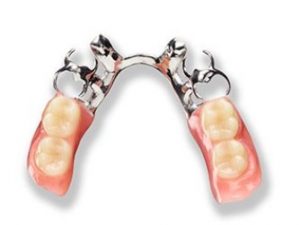
Removable dentures, both full and removable partial dentures, have their own set of advantages and challenges. Their primary advantages include cost-effectiveness and ease of customization. However, they can experience movement during eating or speaking, resulting in discomfort or embarrassment. This makes them less stable and less comfortable than their fixed counterparts.
Caring for Your Dentures
Maintaining the longevity and function of dentures necessitates adherence to a regular cleaning regimen. This involves:
- Removing and gently cleaning them daily
- Soaking and brushing them with a soft-bristled brush and nonabrasive denture cleanser
- Removing them before going to sleep to allow the oral tissues to rest.
Regular dental visits, at least twice a year, are also crucial for checking the fit of the dentures and the health of the oral tissues.
All-on-Four: A Minimally Invasive Approach Using Only Four Dental Implants
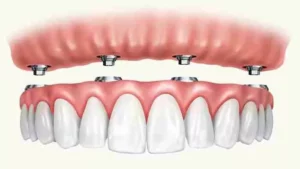
The All-on-Four treatment offers substantial advantages such as a minimally invasive procedure and effective tooth replacement, resulting in faster recovery and reduced discomfort for the patient.
The All-on-Four Treatment Process
The All-on-Four treatment process involves:
- Strategic placement of four dental implants within the jawbone
- Implants are placed in areas of the jaw with higher bone density, typically towards the front of the jaw
- Optimizing stability and support for the prosthetic arch
The procedure, which can also be used for a single tooth dental implant, is usually completed in a single surgery and can replace an entire upper or lower dental arch, making it less complex and more cost-effective than traditional implant procedures.
The treatment generally spans over a period of four to six months from commencement to completion.
Who Should Consider All-on-Four?
The All-on-Four treatment is appropriate for individuals who:
- Have several missing teeth or substantial bone loss
- Desire a fixed, realistic remedy
- Are in good overall physical health
- Maintain good oral health
- Have sufficient bone structure to support the implants
It’s important to note that sufficient bone density is crucial for the success of the All-on-Four treatment.
Fixed Bridges: Bridging the Gap for One or More Missing Teeth
Fixed bridges also present a viable tooth replacement alternative. They are used to replace one or more missing teeth by bridging the gap left by the missing tooth or teeth. Tooth-supported bridges rely on the patient’s existing teeth for support, while a fixed bonded bridge is permanently affixed and requires professional intervention for removal.
The choice between a dental bridge and a denture entails evaluating the number of missing teeth and determining whether a permanent solution, such as a fixed bridge, is more suitable than a removable option like dentures, especially for individuals with one or two missing teeth.
Selection of Materials for Fixed Bridges
Fixed dental bridges are crafted from a diverse range of materials, such as:
- Porcelain fused to zirconia
- Pure porcelain
- Ceramics
- Zirconium
- Composites
- Gold
- Alloys
- Porcelain-fused-to-metal (PFM) bridges
Each material has its own set of advantages and potential drawbacks.
For instance, ceramic bridges present a superb aesthetic resemblance to natural teeth but are more prone to chipping or cracking when compared to other materials.
When to Choose a Fixed Bridge
Choosing a fixed bridge involves considering the number of missing teeth, the patient’s preferences, and their budget. Fixed bridges provide enhanced stability, longevity, and a permanent, non-removable solution with minimal risks. They are a suitable option for patients seeking to replace one or two missing teeth and are more cost-effective and less intricate to install than dental implants.
Complete Dentures: An Overview of Full Arch Replacement
Complete dentures offer a comprehensive remedy for extensive tooth loss. They are prostheses that replace a full arch of missing teeth and are designed to be removable for ease of maintenance and cleaning. The process of creating complete dentures involves:
- Taking impressions of gums and bony ridges
- Recording the preliminary bite
- Creating mounted anatomic models
- Conducting a try-in with a mock-up of the dentures
Cost-wise, a standard set of complete dentures typically ranges from $600 to $1000, while premium dentures crafted from superior materials can range from $4000 to $8000.
The Transition to Complete Dentures
Transitioning to complete dentures usually entails the following steps:
- Extraction of some or all teeth.
- Taking impressions of the patient’s mouth.
- Crafting a personalized base for the dentures.
- Attaching artificial teeth to the base.
- Making any required adjustments for a precise fit.
The entire process to construct a complete denture usually takes around 3 to 4 weeks.
Throughout this process, the dentist collaborates closely with the patient to guarantee comfort and achieve a natural appearance.
Maintaining Dental Health with Complete Dentures
Just like natural teeth, complete dentures require regular and proper care to maintain their function and longevity. This includes:
- Daily cleaning with a soft-bristled brush and nonabrasive denture cleanser
- Soaking them overnight in water or a mild denture-soaking solution
- Removing them before going to sleep to allow the oral tissues to rest.
Regular dental checkups, at least once a year, are also crucial for maintaining the fit and health of the dentures.
The Impact of Doing Nothing: Risks of Not Replacing Missing Teeth
Despite the seeming ease of ignoring a missing tooth, particularly if it’s not visible when smiling, inaction can trigger a series of oral health complications. These include:
- Shifting of the remaining teeth
- Bone loss
- Difficulties with eating and speaking
- Changes in facial appearance
- Increased risk of gum disease and potential infection
Preventing Further Oral Health Issues
Replace missing teeth as soon as possible to enjoy several benefits, including:
- Maintaining the alignment of the remaining teeth
- Preventing bone loss
- Reducing the risk of infection
- Restoring chewing function
- Enhancing appearance
- Improving overall oral health
The absence of a few teeth can increase susceptibility to tooth decay and gum disease, as well as contribute to the deterioration of healthy bone tissue in the jaw and disrupt chewing patterns.
Summary
In conclusion, replacing missing teeth is crucial not just for aesthetic reasons, but also for maintaining overall oral health and function. Whether you opt for dental implants, implant-supported bridges or crowns, dentures, All-on-Four, or fixed bridges, each option has its own set of benefits and considerations. It’s essential to consult with your dentist to determine the best treatment for your unique needs and circumstances. Remember, your smile is an investment worth making!
Frequently Asked Questions
What is the best option for replacement of a tooth?
Dental implants are the best option for replacing a tooth as they provide a strong foundation for fixed or removable teeth, matching your natural teeth.
What is the cheapest way to replace a missing tooth?
The cheapest way to replace a missing tooth is by getting a removable denture or partial removable dentures, which are cost-effective and don’t require surgery or dental crowns. This option takes the least amount of time to construct.
What is the best option for replacing all your teeth?
Dental implants are the best long-term option for replacing all your teeth due to their stability and longevity. Consider consulting with a professional to determine the best option for your specific needs.
What is the All-on-Four treatment, and who is it suitable for?
The All-on-Four treatment involves placing four dental implants to support a full arch of teeth, and it’s suitable for individuals with multiple missing teeth or significant bone loss seeking a permanent and natural-looking solution.
How should I care for my dental implants?
To care for your dental implants, it’s crucial to brush regularly with a soft toothbrush, particularly around the implant area, and to schedule regular professional check-ups. This will help maintain the health of your implants and overall oral hygiene.

